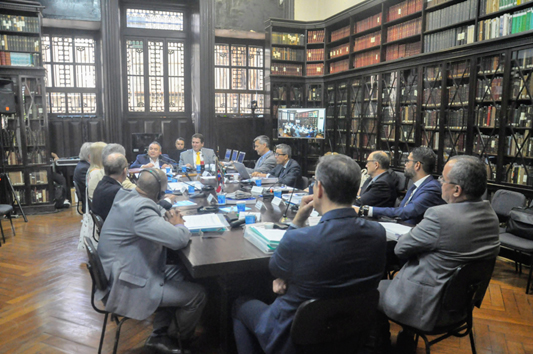
At its recent session from
August 2 to 11, 2023, the CJI adopted a Guide to
Best Practices that contains 32 standards for
updating jurisdictional cooperation through the
use of information and communication
technologies, without modifying or replacing
existing rules in treaty, legal, and regulatory
texts, based on a practical interpretation of
the law.
The work was carried out by Dr. Cecilia Fresnedo
de Aguirre and responds to a mandate from the
General Assembly that requested the CJI to
facilitate “international cooperation in the
inter-American system for the benefit of the
societies of the Hemisphere” [resolution AG/RES.
2959 (L-O/20)].
In preparing the Guide, the author identified
universal, regional and subregional conventions,
in addition to regulations and practices in the
OAS member states and studies of doctrine and
jurisprudence both within and outside the
region. The questionnaires sent to the States
and experts in the region were invaluable and
relied on the support of the American
Association of Private International Law
(ASADIP).
The Guide to Best Practices
recommends mechanisms to make cooperation
procedures under the inter-American conventions
in force more effective and is basically
intended for legal practitioners (judges and
lawyers), without prejudice to regulatory
developments that may arise in the light of
technological advances.
Specifically, the Guide encourages the use of
technological tools in relation to the use or
processing of documents, where the law is silent
in that regard or does not prohibit it, with
full respect for the guarantees of due process.
The Guide invites stakeholders to make use of
technological resources, in particular
electronic case files and institutional e-mails
of officials, the processing of electronic
domiciles in court, the use of
videoconferencing, and the use of digital and
physical signatures, whether digitalized or
scanned, for court documents. In that sense, the
Guide recognizes that court proceedings should
be guided by the principle of evolutionary
interpretation, to the extent that they are
permitted by law and are technically and
economically feasible. Indeed, in cases where
domestic rules forbid the use of technological
means, progressive development is encouraged.
Likewise, the Guide encourages practices to
eliminate legal obstacles, facilitate the
actions of central authorities, and ensure
compliance with formalities without contravening
fundamental principles of international public
order. Special emphasis is given to proceedings
in the area of letters rogatory. As with other
similar texts, the CJI’s Guide to Best Practices
contains non-binding suggestions and proposals
for States (link
to the Guide to Best Practices).
As part of the Secretariat for Legal Affairs,
the Department of Internacional Law acts as
technical secretariat of the CJI.
The CJI serves as advisory body on juridical
matters to the OAS. Its main duty involves the
promotions of the progressive development and
codification of international law.
»
For more information about the Inter-American Juridical Committee (CJI), click
here
»
For more information about the Department of International Law (DIL), click
here